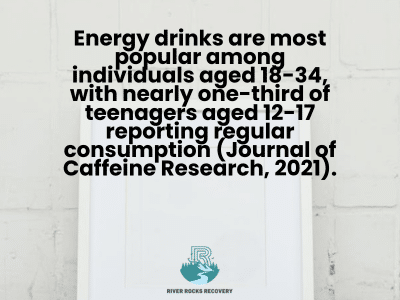In recent years, the tendency to mix alcohol with energy drinks has grown in popularity, particularly among young adults and partygoers. While the combo may appear to be a simple approach to staying motivated while drinking, it actually poses substantial hazards to your health and safety.
Combining alcohol and energy drinks has become increasingly popular, particularly among young adults in social settings. While this mix might seem like a way to enhance energy and stay alert while drinking, the reality is far more dangerous. Mixing these two substances can have serious physical, psychological, and behavioral consequences, often leading to long-term health complications and even addiction. Understanding these threats is critical for making educated decisions and avoiding negative outcomes. So, let’s jump into it and know what you should know.
Why Do People Mix Alcohol and Energy Drinks?
The appeal of mixing alcohol with energy drinks lies in its unique effects:
- Masking Alcohol’s Effects: Energy drinks contain stimulants like caffeine that counteract alcohol’s sedative effects, making people feel more awake and alert.
- Prolonging Energy Levels: Stimulants in energy drinks give the impression of increased stamina and the ability to party longer.
- Enhanced Flavor: Sweet, fruity energy drinks can mask the strong taste of alcohol, making it more palatable.
- Social Trends: Media and advertising have popularized cocktails that include both alcohol and energy drinks.
Risks of Mixing Alcohol with Energy Drinks
1. Masked Intoxication
Energy drinks are stimulants, while alcohol is a depressant. When combined, the stimulant effects of caffeine can mask the depressant effects of alcohol, leading to a false sense of sobriety.
- False Sobriety: Feeling more alert can trick individuals into thinking they are less intoxicated than they actually are.
- Increased Alcohol Consumption: Because energy drinks mask alcohol’s effects, individuals may drink more than they would otherwise, increasing the risk of alcohol poisoning.
- Alcohol Poisoning: Symptoms include confusion, vomiting, seizures, slow breathing, and unconsciousness. Without immediate medical attention, alcohol poisoning can be fatal.
2. Increased Risk of Risky Behaviors
The stimulant effects of energy drinks combined with the reduced inhibitions caused by alcohol can lead to risky decision-making.
- Drunk Driving: Feeling sober while still impaired increases the likelihood of driving under the influence, putting lives at risk.
- Aggressive Behavior: The combination of alcohol’s disinhibition and caffeine’s stimulation can heighten aggression.
- Unsafe Sexual Activity: Reduced judgment often leads to unprotected sex or situations involving consent issues.
3. Cardiovascular Strain
Alcohol and energy drinks both affect the cardiovascular system in opposing ways, creating a strain on the heart.
- Alcohol’s Effects: As a depressant, alcohol slows the heart rate and lowers blood pressure.
- Energy Drink’s Effects: As a stimulant, caffeine and other ingredients in energy drinks increase heart rate and blood pressure.
- Combined Impact: These opposing effects create strain on the heart, increasing the risk of arrhythmias, palpitations, and even heart attacks or strokes, particularly in individuals with preexisting conditions.
4. Dehydration and Electrolyte Imbalance
Both alcohol and caffeine are diuretics, meaning they increase urine production and cause dehydration.
- Severe Dehydration: This can lead to headaches, fatigue, dizziness, and confusion.
- Electrolyte Imbalance: Loss of essential minerals through dehydration can result in muscle cramps, irregular heartbeats, and, in severe cases, hospitalization.
5. Mental Health Risks
Mixing alcohol and energy drinks can negatively impact mental health, especially for individuals already prone to anxiety, depression, or other mental health disorders.
- Increased Anxiety: The stimulants in energy drinks can heighten anxiety, particularly when combined with alcohol’s emotional volatility.
- Mood Swings: Alcohol’s depressant effects paired with caffeine’s stimulation can cause erratic mood swings.
- Sleep Disruption: Both alcohol and energy drinks interfere with sleep cycles, leading to poor-quality rest and long-term mental health consequences.
6. Addiction and Dependence
Combining alcohol and energy drinks increases the risk of developing a dependence on either or both substances.
- Increased Alcohol Tolerance: Regular mixing can lead to higher alcohol consumption over time, increasing the risk of alcohol addiction.
- Caffeine Addiction: Frequent energy drink use can lead to dependence on caffeine, causing withdrawal symptoms such as headaches, fatigue, and irritability.
Long-Term Health Risks
Repeated use of alcohol and energy drinks together can result in long-term complications, including:
- Heart Disease: Chronic cardiovascular strain can lead to hypertension, arrhythmias, and heart attacks.
- Liver Damage: Excessive alcohol consumption over time harms the liver, potentially causing cirrhosis or liver failure.
- Mental Health Disorders: Prolonged sleep disruption, anxiety, and mood swings can contribute to chronic mental health issues like depression or generalized anxiety disorder.

What to Avoid
- Avoid Mixing Alcohol and High-Caffeine Energy Drinks: Avoid beverages that include these incompatible ingredients. If you want to keep energized, try non-caffeinated beverages such as water or electrolyte drinks.
- Consuming Excessive Quantities: Be cognizant of your limitations. Avoid binge drinking or downing many energy drinks in one sitting.
- Ignoring Warning Signs: Listen to your body. If you feel jittery, worried, or have an irregular heartbeat, stop drinking and get medical assistance as needed.
Who is Most at Risk?
Certain individuals and demographics are more vulnerable to the risks of mixing alcohol and energy drinks:
- Young Adults and College Students: This age group is most likely to engage in binge drinking, often while consuming energy drinks.
- Individuals with Preexisting Conditions: Those with heart conditions, high blood pressure, or anxiety disorders face heightened risks.
- Frequent Consumers of Energy Drinks: Regular energy drink users already have elevated heart rates and blood pressure, making alcohol’s effects even more dangerous.
Signs You May Need Help
If you or someone you know frequently mixes alcohol and energy drinks, it’s important to recognize the warning signs of substance use or dependence:
- Increased Alcohol Consumption: Drinking more than intended or needing alcohol to socialize.
- Behavioral Changes: Engaging in risky or harmful actions while under the influence.
- Physical Symptoms: Experiencing heart palpitations, chest pain, or persistent fatigue.
- Mental Health Issues: Struggling with anxiety, depression, or insomnia.
Preventive Measures: Safer Choices
To reduce the risks associated with mixing alcohol and energy drinks, consider these safer alternatives:
- Limit Alcohol Intake: Set boundaries for how much you drink during social settings.
- Avoid Energy Drinks with Alcohol: Opt for non-caffeinated mixers or alternate with water to stay hydrated.
- Stay Educated: Understand how substances interact and make informed decisions about what you consume.
- Seek Support: If you feel reliant on alcohol or energy drinks, seek professional guidance to address underlying issues.
How River Rocks Recovery Can Help
At River Rocks Recovery, we provide comprehensive, evidence-based treatment programs to address the challenges associated with substance use and co-occurring mental health conditions.
1. Addiction Treatment Program
Our Addiction Treatment Program helps individuals understand the root causes of their substance use and equips them with the tools to achieve lasting sobriety.
2. Partial Hospitalization Program (PHP)
PHP offers intensive, structured care, including therapy, medical monitoring, and holistic treatments, for those requiring a high level of support.
3. Intensive Outpatient Program (IOP)
IOP provides flexibility for individuals balancing recovery with work, school, or family responsibilities while still receiving structured therapy and group support.
4. Sober Living Program
Our Sober Living Program offers a safe, supportive environment for individuals transitioning from treatment to independent living.
5. Mental Health Therapy
Substance use often co-occurs with mental health challenges. Our Mental Health Therapy integrates Cognitive-Behavioral Therapy (CBT), mindfulness practices, and trauma-focused care to address these issues.
Finding the Right Help for Addiction? Call River Rocks Recovery!
Addiction might be daunting, but you do not have to confront it alone. At River Rocks Recovery, we offer caring, and evidence-based treatment that is personalized to your specific requirements. Our professional team is with you every step of the journey, providing support, tools, and ideas to help you achieve long-term recovery.
Conclusion
While mixing alcohol with energy drinks may seem harmless or fun in the moment, the risks to physical and mental health are significant. From masking intoxication to increasing the likelihood of risky behaviors and long-term health complications, this combination is not worth the potential consequences.
At River Rocks Recovery, we are committed to helping individuals break free from harmful behaviors and achieve healthier, more fulfilling lives. If you or a loved one is struggling with substance use or mental health issues, don’t wait to seek help. Call us today at (888) 905-6281 to learn more about our programs and take the first step toward recovery.
FAQ on Risks of Mixing Alcohol with Energy Drinks
Why is mixing alcohol with energy drinks dangerous?
Mixing alcohol with energy drinks is dangerous because the caffeine in energy drinks masks the sedative effects of alcohol, leading to overconsumption, risky behaviors, and serious health risks like alcohol poisoning and cardiovascular strain.
Can energy drinks make me feel less drunk?
Yes, the stimulants in energy drinks can make you feel more alert, masking the symptoms of intoxication. However, this does not reduce your level of impairment or blood alcohol content (BAC).
What are the health risks of combining alcohol and energy drinks?
The risks include increased heart rate and blood pressure, dehydration, sleep disruption, anxiety, risky behaviors, and long-term complications like heart disease and mental health issues.
Who is most at risk for the dangers of mixing alcohol with energy drinks?
Young adults, college students, frequent energy drink users, and individuals with preexisting health conditions like heart problems or anxiety disorders are particularly vulnerable.
How can I reduce the risks if I drink alcohol?
Avoid combining alcohol with energy drinks, stay hydrated with water, limit your alcohol consumption, and seek professional help if you feel reliant on alcohol or energy drinks.




























